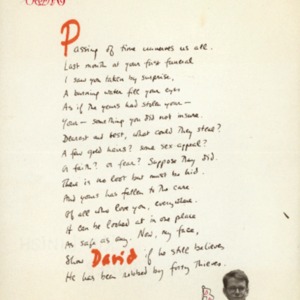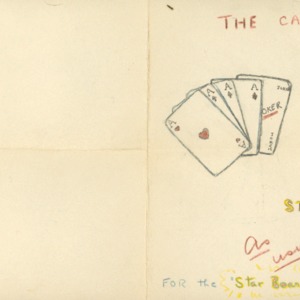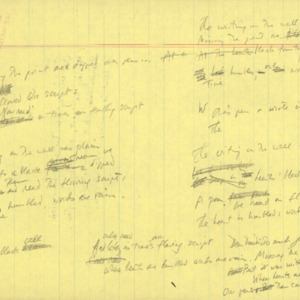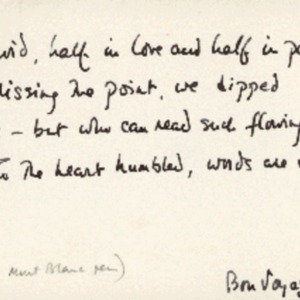The Occasional Verse
Dublin Core
Title
Description
In poems expressed as party invitations, birthday sentiments, holiday wishes, love notes, get-well cards, epithalamia, postcards, and accompaniments to gifts, James Merrill brought verse into everyday life. These occasionals commemorate stilled moments — intersections between the poet and his mother, friends, and lovers — yet they are not dampened or limited by the grounding moment for which they were written. Rather, in these works, Merrill imbues the everyday with metaphor, humor, and new meanings for those closest to him.
Many of the poems Merrill wrote for celebrations create gifts that can only be given through metaphor. By figuratively inscribing interpretation onto an image, these poems symbolically offer meanings. In a poem for David Jackson's fortieth birthday, Merrill moves beyond consolation to offer a solution to time's loss. The poem touchingly, and, of course, humorously hands over a manner of thinking that might alleviate Jackson's anxiety over aging. "A Birthday Cake for David" gives a metaphorical cake that can be, like one's affection, both lasting and consumed. The more austere poem that Merrill wrote for his mother's wedding offers an interpretive gift, one that draws the wedding into the classical orchard. The manner of giving in these poems lays bare Merrill's deep trust in language and its ability to concretize sentiment and meaning more tangibly than any actual object.
All of Merrill's poems for occasions illustrate his constant, often incorrigible engagement with language. The depth of this engagement announces itself in the many revisions of the occasional poems Merrill presented as quickly drafted notes. For one such poem, a four-line note he wrote to accompany the gift of a pen, Merrill refigured the poem at least six times before he presented it, and then one more time before he preserved it on a running sheet of such notes. While the initial version of the poem begins, "The writing on the wall was plain. / Missing the point, one dipped one's pen," the version given with the gift begins, "Dear David, so much joy and so much pain / Missing the point we dipped / our pens."
A variation on this line appears in Merrill's poem "Yannina" in Divine Comedies: "For partings hurt although we dip the pain / Into a glowing well — the pen I mean." The relationship between "pen" and "pain," between writing and remembering, clearly haunts Merrill's vision and revision; even a small note, for one person's eyes only, is troubled by the pressure to transcribe the correlation between the terms. The final line of the final version, the wording of which is almost identical to the initial version, reads: "Where hearts are humbled, words are vain." While Merrill might be seen as relinquishing the demands of experience to be transcribed, he is offering this line as he offers the essential tool of writing.
Often the notes that Merrill wrote were surprisingly spontaneous, off the cuff, and off-color. He celebrates a six-week hiatus from cigarettes in a quatrain of rhyming dimeter to his mother, for example, and then in another quatrain, he invites a lover to smoke a joint. Merrill is playfully self-aware of the contradiction between his public writing and the sometimes-doggerel verse that employs the poetic forms and techniques elsewhere turned to elegance. The occasionals release Merrill, in specific moments, from the constraints of his aesthetic and his reputation. Where else can Merrill write of himself, as he does in a bon voyage postcard picturing an Indian royal tent: "Many's the day / JM just went / And sulked inside / his disconTENT."? Often, with humor and irony and intimacy, these notes demonstrate a pleasure in language for its own sake.
The occasional poems show Merrill weaving poetry and the everyday with the linguistic sensitivity for which he is known. Because these poems were written for occasions, they literalize the leaps that characterize much of Merrill's work; narrative events become an arena in which to think about the connections we have to each other and the trajectories of a life, while the arena is altered in the process.
Creator
Identifier
bdaycard2.gif
yellowpaper-notes.gif
card1970.gif




